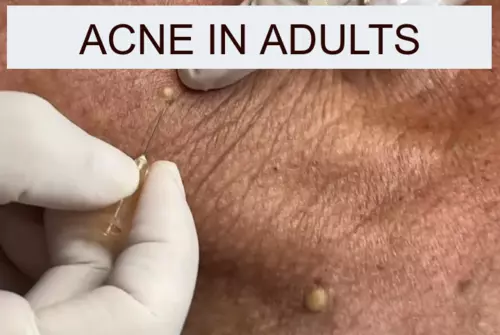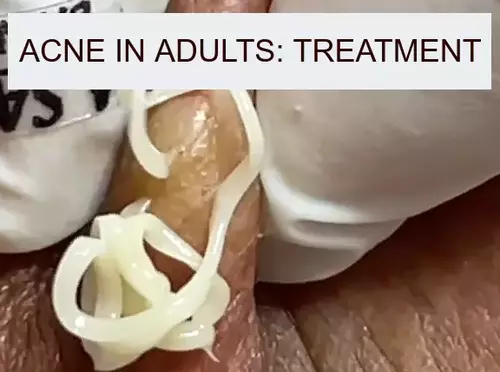Acne in adult men and women is a reality. This acne has several causes and can be treated and successfully dealt with.

We used to think of acne as a problem typical for puberty. But it often happens that a person becomes an adult, but the rashes do not disappear. There are still periodic papules and pustules, painful subcutaneous pimples and black spots on the face (blackheads). Let’s talk about why this happens.
Causes of Acne in Adults
Acne disease – the consequence of excessive sebum activity. Sebum so much that the skin simply can not cope with its withdrawal, resulting in clogged sebaceous glands, they are inflamed. In the dilated pores clogged sebum, when oxidized, it turns black. Such activity of the sebaceous glands is caused by hormonal background. The reason is the increased level of testosterone. And it occurs not only in adolescence, but also in adulthood.
Elevated levels of free testosterone may be an individual characteristic or a consequence of pathology. In women, a pronounced degree of acne can often be a symptom of polycystic ovarian syndrome.
In any case of acne, it is worth taking a test for sex hormones and a biochemical blood test. For women, an ultrasound examination of the pelvic organs, with a focus on the ovaries, is a must.
Hyperandrogenism may be caused by:
- hereditary factors;
- abnormalities of the thyroid gland;
- adrenal hyperfunction and other causes.
Genetics
Many skin diseases, such as psoriasis and atopic dermatitis, are genetically conditioned. Doctors have long noticed that there is a hereditary predisposition to the development of acne disease. Even in puberty, acne affects more often those children whose parents had similar problems. Scientists have found that several genes, including HLA-DRA, are responsible for the development of severe acne.
In this case, the level of testosterone in the blood may be in the normal range, but the skin receptors are too sensitive to androgens and this feature is due to genetics.
One of the symptoms of premenstrual syndrome
A woman’s life is divided into cycles. Endometrial changes, ovulation and menstruation are caused by cyclical hormonal changes. A few days before menstruation, many women experience a spectrum of unpleasant symptoms:
- Thickness and soreness in the breasts;
- mood swings;
- bloating of the abdomen;
- headaches;
- deterioration of the skin – rashes, pimples, inflammation.
In this case, treatment is not required if the rashes are sporadic. In severe cases, acne treatment is required to maintain the barrier function of the skin and improve aesthetics.
Improper nutrition
If there are no health problems, it is worth paying attention to diet. Acne in an adult can appear when the following foods are abused:
- sweets;
- bakery products made from extra-fast flour;
- alcohol;
- canned foods;
- Overly salty and spicy foods.
- Among other things, the condition of our skin is affected by stress, lack of sleep, and poor hygiene.
Diagnosis of acne in adults
It is desirable to visit a dermatologist at any stage of acne development. If there are large painful elements on the skin, it should be done as soon as possible.
When diagnosing the form of acne, the following are taken into consideration:
- The number of elements;
- type of elements;
- localization;
- presence of post-acne spots;
- duration.
Treatment of acne in adults
Should acne in adults be treated? The earlier treatment begins, the less effort it will take to get rid of acne.

With a mild degree of the disease, external therapy is usually sufficient. Appointed active procedures in the clinic, such as mechanical cleansing, chemical peels. As a rule, is assigned a course of peels, based on salicylic and pyruvic acids, in the middle of the course performed mechanical cleansing. Sometimes in the initial stage of treatment mechanical cleansing is required quite often. Therefore, a course of chemical peels may also be completed by a mechanical cleaning. At the same time, home remedies of pharmacy or professional brands are always prescribed.
In the treatment of acne in adult men and women of average severity, systemic therapy is connected to the external treatment. Necessary tests are prescribed (clinical blood analysis, biochemical blood analysis, general urinalysis), and the patient’s hormonal status is studied. Given the results of the tests, antibiotics or oral contraceptives with an antiandrogenic effect are prescribed.
Anti-androgens are used only for the treatment of women. The consultation of a gynecologist-endocrinologist and thorough examination of the patient’s hormonal background are required beforehand. Some oral hormonal contraceptives have an antiandrogenic effect.
In severe forms, medications based on isotretinoin are used. This drug is used only for severe forms of acne. It is contraindicated for women who could potentially become pregnant and is usually prescribed along with contraceptives. The drug has a number of side effects, this concerns changes in laboratory values and manifestations such as headaches, dry skin. Therefore, patients with severe acne who take isotretinoin-based medications should be under strict medical supervision.
Treatment of post-acne is often more complicated and takes longer than treating the acne itself. That is why it is very important to see a doctor in time at the appearance of the first symptoms of acne.
Separate from the complex post-acne want to highlight a factor such as the psychosomatic state of the patient. Often these patients are constrained, stiff. Because of the “spoiled” face they try to lead a closed lifestyle, they develop a lot of complexes and resentments, and their mood is reduced. This is why the doctor first needs to establish a close, stable contact with the patient, and sometimes requires parallel work with a psychologist. Such patients need to be specific about each prescribed medication and highlight the actual results.
How long does it take to treat acne
Acne treatment depends on the severity and can last for years. In severe forms of acne, isotretinoin-based medications are taken for about a year, then external agents are used. After completion of active therapy, special skin care will be required for many years.
Conclusions
Adult acne may occur for the following reasons:
- Hormonal imbalance, hyperandrogenism;
- heredity;
- diseases of the thyroid gland, adrenal glands;
- premenstrual syndrome;
- unbalanced diet rich in fast carbohydrates;
- Stress, insomnia, psycho-emotional stress;
- bad habits;
- Improper and insufficient cleansing of the skin.
Skin is a reflection of inner health. If acne persists as an adult, it is worth taking a holistic approach to the examination of the body. Only then can the true cause be found and eliminated. Dermatological diseases, including acne, should be treated by a doctor, who will make an individual therapy plan.
About the Author
Reyus Mammadli is the author of this health blog since 2008. With a background in medical and biotechnical devices, he has over 15 years of experience working with medical literature and expert guidelines from WHO, CDC, Mayo Clinic, and others. His goal is to present clear, accurate health information for everyday readers — not as a substitute for medical advice.






